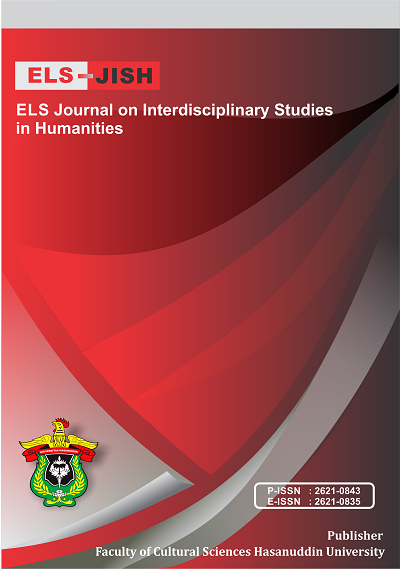Expressive Act by Elite Politicians in Responding Issue of “Coup d’etat” in Democratic Party”
DOI:
https://doi.org/10.34050/elsjish.v4i1.13362Keywords:
Coup d’etat, Elite Politicians, Democratic Party, , Expressive ActsAbstract
Democratic party is one of the greater parties that exists in Indonesia. Its existence gives significance colors in national politics. The declaration of coup’ d etat effort in front of the pers invites the politicians giving their responds. This research tries to investigate expressive act by the elite politicians. The method used in this research was qualitative method. To collect the data, documentation technique was used. It meant that the data were downloaded from internet. There were six videos taken from internet with 12 politicians. Those videos discussed the issue of coup d’etat in democratic party. The collecting data were transcribed without blurring the meaning. In displaying the data, the researchers investigated expressive acts used by every politician and then put them into the table of expressive acts. The results of this research revealed that there were two groups of politicians with different expressive acts. The group of pro and contra toward the issue of coup d’etat. In pro group used expressive act of approving, convincing, confessing, criticizing, and fearing. While the contra used disapproving, resentment, shocking and lamenting. Whole the expressive acts, both in pro and contra, were categorized into psychological and attitude effects. The psychological effect included the emotional range such as fearing, shocking, lamenting, and resentment. While, the attitude effect included the range of cognition, affection, and connation such as approving, disapproving, convincing, confessing, and criticizing. The implying meaning showed both the existence of coupd’etat and conspiracy thinking of elite politicians.
References
Austin, J. L. (1955). How to Do Things with Words. Cambridge: Harvard University Press.
Bachriani, AH Yassi, AH., Rahman, F. (2018). A Comparative Study of Euphemism In English And Buginese: Pragmatic Stylistics Contexts. ELS Journal on Interdisciplinary Studies in Humanities 1 (4), 429-440
Kompas. (2018). Rumah Pemilu: Ini 14 Partai Politik Peserta Pemilu 2019. Kompas.com retrieved 17/02/2018 Available in https://nasional.kompas.com/read/2018/02/17/13333761/ini-14-partai-politik-peserta-pemilu-2019
Leech, G. (1989). Principles of Pragmatics. London: Longman.
Norrick, N. R. (1978). Expressive illocutionary acts. Journal of Pragmatics, 2(3), 277–291. https://doi.org/10.1016/0378-2166(78)90005-x .
Nuraini, F. I, Susanto, D., Rahmi, N.S., & Kaptania, R.O. (2020). Expressive Speech Act in Lakon Politik Republik Episode of Mata Najwa Talk Show. Leksema: Jurnal Bahasa dan Sastra, Volume 5 No 1 Januari-Juni 2020, E-SSN: 2527-807X, P-SSN: 2527-8088.
Rahman, F. (2018). The Constraints of Foreign Learners in Reading English Literary Works: A Case Study at Hasanuddin University. Journal of Arts & Humanities (JAH), 7(2), 01–12.
Rahman, F., Abbas, A., & Hasyim, M. (2019). Facebook Group as Media of Learning Writing in ESP Context: A Case Study at Hasanuddin University. The Asian EFL Journal, 26(6.1), 153–167.
Rohmah, Neneng S. (2018). Elit dan Pemekaran Daerah; Konflik antar Elit Dalam Proses Pembentukan Provinsi Banten. Cosmogov: Jurnal Ilmu Pemerintahan Vol 14, No.1 April 2018. ISSN 2442-5958 E-ISSN 2540-8674.
Sarwono, Sarlito Wirawan. 1999. Psikologi Sosial (Individu dan Teori-Teori Psikologi Sosial). Balai Pustaka. Jakarta.
Searle, J.R. (1979). Expression and Meaning. Cambridge: Cambridge University.
Suherman, L. A. (2018). The Analysis of Metaphorical Domain on English “Stab Verb” in Corpora. ELS Journal on Interdisciplinary Studies in Humanities, 1(1), 52-58.
Skandera, P & Burleigh P. (2005). A Manual of English Phonetics and Phonology. GNV (Guntert Narr Verlag Tubingen. Germany.
Tamam, B, Setiawan, S., & Anam., S. (2020). The Expressive Speech Act Used by Anies Rasyid Baswedan and Recep Tayyip Erdogan as the Reaction of the Attacks in Christchurch New Zealand. Prasasti: Journal of Linguistics, Vol 5 No 1 April 2020 ISSN: 2527-2969.
Yule, George. (1996). Pragmatics. USA: Oxford University Press.
Yule, George (2010). The Study of Language (4th Edition). Cambridge: Cambridge.
Weda, S et al. (2021). Factors Affecting Students’ Willingness to Communicate in EFL Classroom at Higher Institution in Indonesia. International Journal of Instruction (Scopus) 14 (2)
Downloads
Published
How to Cite
Issue
Section
License
Copyright (c) 2021 Lewi Kabanga', Yohanes Moruk, Upi Laila Hanum

This work is licensed under a Creative Commons Attribution-NonCommercial-ShareAlike 4.0 International License.






